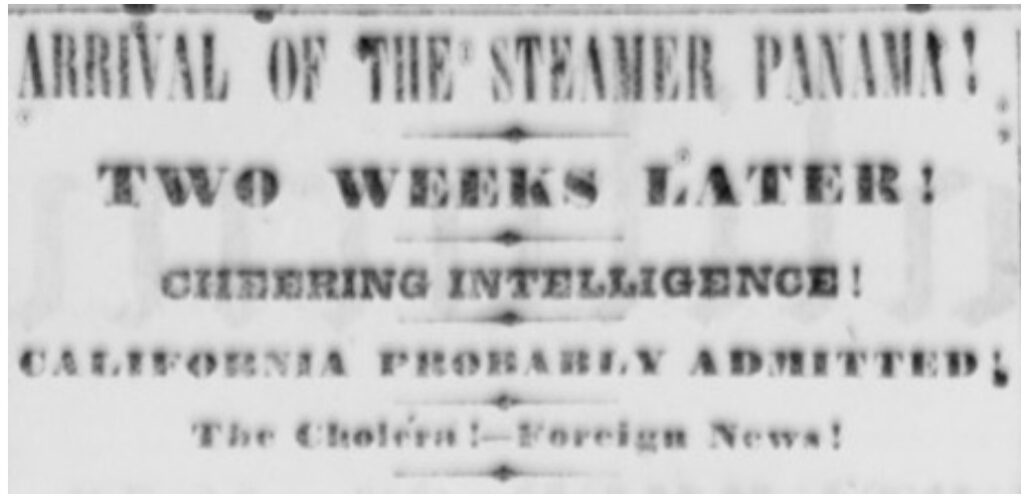Happy 175th birthday California!
California was admitted as the 31st state of the Union 175 years ago today on September 9, 1850. The matter was fraught with tensions of the day, with debates raging here and in Congress over the state’s boundaries, whether it should be one state or two, and of course the slavery question. Following the failure of the Wilmot Proviso (which would have banned slavery in territory acquired from Mexico in the Mexican–American War), Congress instead adopted the Compromise of 1850. Among the package of bills were provisions admitting California as a free state, organizing the remaining portions of the Mexican Cession into New Mexico Territory and Utah Territory, and allowing the people of those territories to decide whether to permit slavery. Debates in Congress over California’s admission thus were part of the constellation of conflicts leading to the Civil War.
The Act for the Admission of the State of California into the Union passed by the 31st Congress was signed by President Millard Fillmore on September 9, 1850 — but the news took quite a time to reach the expectant Californians. News from the east coast back then primarily arrived in California by steamship, and each day as new ships docked in San Francisco the local papers breathlessly reported rumor and speculation about what Congress might do.
An early rumor of admission was tracked to its source by diligent reporters and found to be false. As the Daily Alta California reported on September 14, 1850: “Soon after the arrival of the Isthmus, yesterday, a report was circulated that the Compromise Bill had passed the Senate and that California was admitted. We traced this report to its source and ascertained that a gentleman in this city had received a letter from New York, dated the 1st of August, announcing the receipt of a telegraphic dispatch which stated that there had been a rally upon the Compromise Bill of Mr. Clay, in the Senate, and that it had passed.”
Each new ship arriving brought excitement and hope: the steamer Panama’s arrival on September 23, 1850 provided inconclusive news by then already over a month old. As reported by the Daily Alta California: “The news with regard to California by this arrival is highly encouraging, a bill for the admission of the State with the boundaries prescribed by her constitution having passed to engrossment in the Senate on the 12th of August.”
And with the call, the Daily Pacific News, October 19, 1850:
CALIFORNIA ADMITTED.
We announce again to our readers, this morning, the glorious intelligence communicated throughout the city yesterday afternoon, in our extra, that California has been ADMITTED INTO THE UNION. The golden offering has been accepted. The bright galaxy has been enlarged, and the Star that has so long waited in the distance, takes its appropriate place, conferring and receiving honor by the association.
Anxiously have we waited for this event, and it comes at last, to greet us with a joyful welcome.
According to previous arrangement, made with the steamers in the event of our admission, the Oregon commenced firing a salute as she entered the Golden Gate, yesterday, about half-past 11 o’clock, and as she sailed up the harbor, continued to fire her guns, the boat being decorated with flags from bow to stern, while stretched across from mast to mast, were the magic words, on canvass,
“California has been Admitted !”
The steamer continued on her course to Rincon Point, on the southern extremity of the city, and turning gracefully, as though elated herself at the joyful intelligence, made her way back to her accustomed moorings.
The firing of the guns had awakened our citizens, who were gathering in throngs, and covered the housetops, and as soon as the first authentic information reached shore, the streets presented one continued scene of rejoicing. Flags floated from every staff, from the roofs and windows of public buildings, the lone Golden Star being attached to the bright constellation that already graced the ample fold of stripes.
Immediately after the receipt of the intelligence, Deputy Sheriff Mathews and B. Dexter, Esq., proceeded to the Revenue Cutter Lawrence, Capt. Frazier, and this officer promptly placed in their hands the Battery of the vessel, which was taken to the Grand Plaza, and soon the echoes of the “loud mouthed cannon’ reverberated amongst the hills, and the welkin rang with the glad shouts of assembled thousands.
Throughout the afternoon, the city was one continued scene of rejoicing, and in the evening the streets presented an appearance that beggars description. Buildings were illuminated, flags decorated the houses, guns were fired at Clark’s Point, at Long Wharf, on the Plaza, and at several other places, the drums beat, and the rising generation of California, catching the spirit of the festive occasion, gave vent to their enthusiasm in innumerable species of rockets, serpents, crackers, and all the other brilliant and fiery evidences of rejoicings.
Thus it was throughout the night, and when the small hours crept on apace, still could be heard the fife and drum, the cannon’s roar, and the glad plaudits of our citizens. But had we time, we have not space in our sheet to record the evidences of pleasure which marked our city on the occasion.
California is now a sovereign State; acknowledged and recognized by the Federal Government. Her representatives at Washington can speak and act for her interest and guard her welfare. Thousands of miles from her sister states, an empire almost, by herself, she will still be found obedient and faithful to the glorious Charter that binds in one common bond of union, the loved “homes of the Free,” and will be amongst the first to defend and advance the common interest of the whole.
Celebrate the Bear Flag and the California Republic today.

—o0o—





